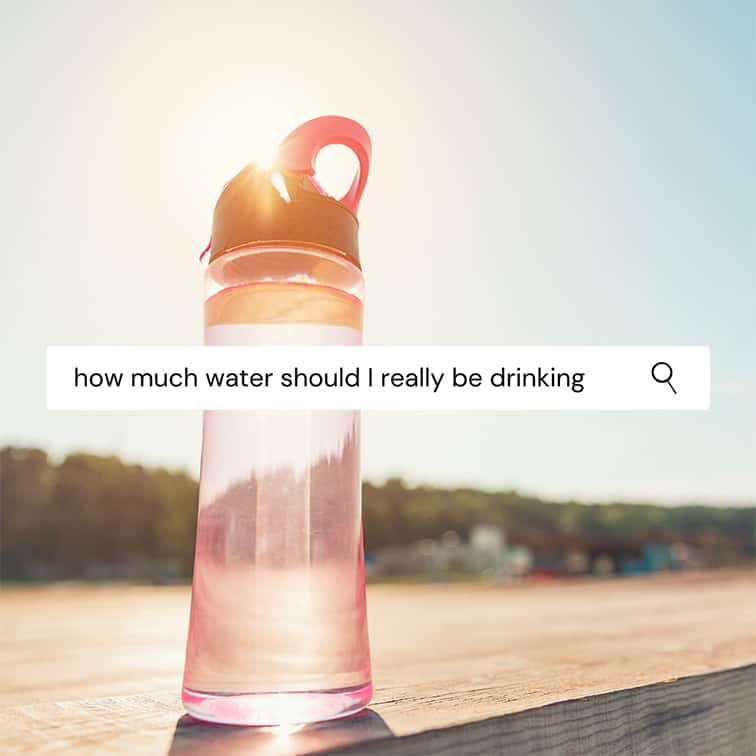How Much Water Should You Really Be Drinking?
Water is an absolutely vital substance for all known forms of life, and the human body is predominantly made up of H2O, thriving when it is properly hydrated. Despite being void of calories or other nutrients, it is critical for all systems, organs, and tissues in the body. Water makes up roughly 60 percent of our body mass, and it is involved in many cellular reactions. Water keeps blood pressure balanced, flushes toxins, lubricates joints, aids in digestion, and regulates temperature. So, drinking enough water can benefit the way we function, move, and even think!

As simple and easy as it sounds, drinking enough water can be a challenge for many of us. In my clinical practice, I ask each patient how much water they drink every day. And on average, 75% of my patients will say “not enough.” Drinking water is a lifestyle behaviour I often have to educate about.
Dehydration can occur quickly, and many of us don’t recognize the need for water until we are already dehydrated. In fact, the feeling of thirst often occurs once our body has been dehydrated for several hours, when the brain receives the cue to signal us to take a drink. Other signs and symptoms of dehydration include headaches, fatigue, muscle cramps or spasms, dry mouth, dark-coloured urine, confusion, and dizziness.
Bring on the water!
As summer approaches, many of us are spending more time outdoors, sharpening our gardening skills, or maybe even training for a triathlon. Being more active and spending more time in the heat can cause us to sweat more. Sweating is the body’s way of cooling us down and maintain a stable core temperature, since heat loss is increased through the evaporation of water. We lose water when we sweat, and it’s important to replace that water to stay hydrated.
It makes this time of year even more important when being mindful of your water intake. So how can you remember to drink enough? Some tips to help you remember to drink more water include certain phone apps, carrying around a water bottle (choose BPA-free, stainless steel, or glass bottles), or setting an alarm in your calendar. Placing glasses around your home can also help, such as on your bedside table, or in your bathroom.
Can I add anything?
In general, fruit juice, coffee, tea, and other drinks do not count towards your water intake, even though water may be the main ingredient in these. Artificial colours and flavours should also be avoided, but you can find sugar-free, naturally flavoured waters, carbonated or bubbly water, or use ice cubes to encourage water intake. Adding a lemon slice is another way, but sipping on water with lemon over long periods of time can affect tooth enamel, so it’s best to down lemon water fairly quickly to limit the time your teeth are exposed. At the end of the day, I encourage plain-old purified water, especially in kids, to get them used to drinking a “no-frills” version of the most important fluid for our bodies.
What about electrolytes?
Water is important to rehydrate us, but without the proper mineral support in the form of electrolytes, the water we drink won’t stay in our cells where we need it. Electrolytes are minerals with an electric charge in the body. They include sodium, calcium, potassium, chlorine, phosphate, and magnesium, and are found in blood, urine, and body fluids, including sweat.
Maintaining the right balance of electrolytes is important to support hydration, normal blood chemistry, muscle activity, and other processes. Electrolytes are involved in maintaining healthy blood pressure, nerve activity, muscle health, and thyroid function, and they maintain acid-base and water balance in the body.
Most of the time, we get enough electrolytes in the food we eat, but if you are engaging in daily moderate-to-intense exercise, or if you notice you are perspiring more, it might be wise to consider supplementing. Unfortunately, several common electrolyte drinks on the market include a lot of sugar as well as artificial colours and flavours, not to mention a pretty high price tag. Instead of pre-made drinks, electrolytes can be found in the form of powder, liquid, and even capsules.
So how much should you really be drinking?
So, at the end of the day, how much water should you drink? The answer depends on several things, including your age, weight, activity level (and hence the amount you sweat), as well as underlying health conditions.
The general recommendation for adults is 0.5 oz per pound of body weight per day. For a 160-pound person, this would equate to 80 oz or 10 cups (just over 2.5 L) per day. Too much or too little can pose health problems; however, certain health conditions such as diabetes insipidus, kidney problems, and congestive heart failure may require adjustments to this recommendation. It is important to always discuss lifestyle changes with your health care practitioner, so you can get an individualized recommendation.
Whether you think you may be dehydrated or if you are training for a marathon in the hot sunny months, these tips on getting the correct hydration can help you reach your goals, but more importantly, have a more enjoyable and active summer!
.png)